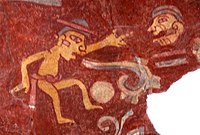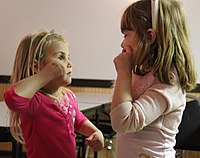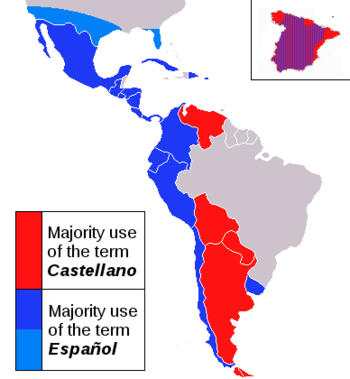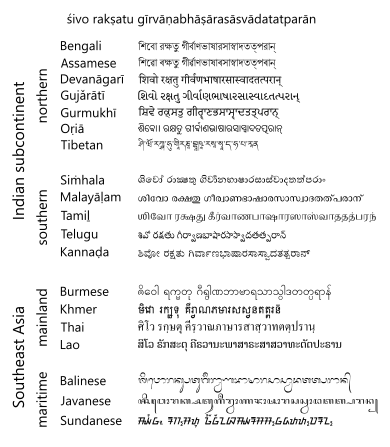Portal:Language
Introduction




Language is a structured system of communication that consists of grammar and vocabulary. It is the primary means by which humans convey meaning, both in spoken and signed forms, and may also be conveyed through writing. Human language is characterized by its cultural and historical diversity, with significant variations observed between cultures and across time. Human languages possess the properties of productivity and displacement, which enable the creation of an infinite number of sentences, and the ability to refer to objects, events, and ideas that are not immediately present in the discourse. The use of human language relies on social convention and is acquired through learning.
Estimates of the number of human languages in the world vary between 5,000 and 7,000. Precise estimates depend on an arbitrary distinction (dichotomy) established between languages and dialects. Natural languages are spoken, signed, or both; however, any language can be encoded into secondary media using auditory, visual, or tactile stimuli – for example, writing, whistling, signing, or braille. In other words, human language is modality-independent, but written or signed language is the way to inscribe or encode the natural human speech or gestures.
Depending on philosophical perspectives regarding the definition of language and meaning, when used as a general concept, "language" may refer to the cognitive ability to learn and use systems of complex communication, or to describe the set of rules that makes up these systems, or the set of utterances that can be produced from those rules. All languages rely on the process of semiosis to relate signs to particular meanings. Oral, manual and tactile languages contain a phonological system that governs how symbols are used to form sequences known as words or morphemes, and a syntactic system that governs how words and morphemes are combined to form phrases and utterances.
The scientific study of language is called linguistics. Critical examinations of languages, such as philosophy of language, the relationships between language and thought, how words represent experience, etc., have been debated at least since Gorgias and Plato in ancient Greek civilization. Thinkers such as Jean-Jacques Rousseau (1712–1778) have argued that language originated from emotions, while others like Immanuel Kant (1724–1804) have argued that languages originated from rational and logical thought. Twentieth century philosophers such as Ludwig Wittgenstein (1889–1951) argued that philosophy is really the study of language itself. Major figures in contemporary linguistics of these times include Ferdinand de Saussure and Noam Chomsky. (Full article...)
Selected language -
Maybrat is a Papuan language spoken in the central parts of the Bird's Head Peninsula in the Indonesian province of Southwest Papua.
Maybrat is also known as Ayamaru, after the name of its principal dialect, while the divergent Karon Dori dialect has sometimes been counted as a separate language. Maybrat has not been demonstrated to be related to any other language, and so is often considered a language isolate. Nevertheless, in its grammatical structure, it has a number of features that are shared with the neighbouring languages. (Full article...)
Did you know (auto-generated)

- ... that when students spoke Vietnamese in a graduation speech in Louisiana, the school district proposed banning all non-English languages?
- ... that Ivan Ančić was the first Bosnian Franciscan to use the Latin script to write in his native language?
- ... that the Yiddish-language satirical newspaper Munkatsher Humorist frequently joked about disputes between the Hasidic courts of Munkacs and Belz?
- ... that Ephraim E. Lisitzky wrote an epic poem in Hebrew based on Native American legends?
- ... that the Greco-Australian dialect, a variety of Modern Greek, blends words with English roots into the Greek language?
- ... that after four years in the making, the Minimal BASIC standard was described as "more a toy than an actual language"?
More did you know -
- ...that a large portion of the vocabulary of the coastal Mozambiquean language Koti derives from a past variety of Swahili?
- ...that the Ambelau, Buru, Kayeli and Lisela people and their Ambelau, Buru, Kayeli and Lisela languages are unique to the Indonesian islands of Buru and Ambelau?
- ...that the Korean dialect spoken by ethnic Koreans in Japan has changed so much that some of its speakers don't think it can be properly referred to as "Korean" anymore?
- ...that the National Language Authority in Pakistan is the first autonomous regulatory institution to have internationally standardized the Urdu language code table and Urdu keyboard for typewriters, teleprinters, and computer software?
Categories
Linguistics: Computational linguistics • Grammar • Historical linguistics • Morphology • Phonetics • Phonology • Pragmatics • Reading • Semantics • Sociolinguistics • Syntax • Writing
Languages: Language families • Pidgins and creoles • Sign languages
Linguists: By nationality • Historical linguists • Morphologists • Phoneticians • Phonologists • Sociolinguists • Syntacticians • Translators
Stubs: Constructed languages • Languages • Linguists • Pidgins and creoles • Typography • Vocabulary and usage • Writing systems
Full Language category tree
|
|---|
|
Select [►] to view subcategories
|
Related portals
Selected topic -
Articles 4 and 114 of the Constitution of Latvia form the foundation for language policy in Latvia, declaring Latvian to be the official state language and affirming the rights of ethnic minorities to preserve and develop their languages. Livonian language is recognized as "the language of the indigenous (autochthon) population" in the Official Language Law, but Latgalian written language is protected as "a historic variant of Latvian." All other languages are considered foreign by the Law on State Language (Official Language Law in other translations). Latvia provides national minority education programmes in Russian (the first language for over one third of the population), Polish, Hebrew, Ukrainian, Estonian, Lithuanian, and Belarusian.
The preamble to the Official Language Law includes as its goals "the integration of members of ethnic minorities into the society of Latvia, while observing their rights to use their native language or other languages; [and] the increased influence of Latvian in the cultural environment of Latvia, to promote a more rapid integration of society." (Full article...)
Selected picture -

Geographical distribution of the preferential use of the terms castellano (Castilian), in red, vs. español (Spanish), in blue, to refer to the Spanish language
Language News
- 22 November 2024 – Censorship in Belarus
- In a speech at Minsk State Linguistic University, Belarusian President Alexander Lukashenko threatens to shut down the Internet in his country if there are mass protests before the upcoming presidential election after the previous election saw mass protests. (Rferl)
- 20 August 2024 – Germany–Iran relations
- Following the ordered closure of the Islamic Centre Hamburg in Hamburg, Germany, Iran orders the closure of two branches of a German language school in Tehran for "breaching Iranian law, committing various illegal actions and extensive financial violations." In response, Germany summons the Iranian ambassador. (DW)
- 19 July 2024 –
- Ukrainian linguist, nationalist politician, and former People's Deputy Iryna Farion is shot and killed in Lviv, Ukraine by an unknown assailant. (Reuters)
- 27 June 2024 –
- Ukrainian president Volodymyr Zelenskyy signs a law establishing English as an official language of international communication in Ukraine. (The Kyiv Independent)
Topics

Languages of Africa: Arabic, Chadic, Cushitic, Kanuri, Maasai, Setswana, Swahili, Turkana, Xhosa, Yoruba, Zulu, more...
Languages of the Americas: Aleut, Carib, Cherokee, Inuktitut, Iroquois, Kootenai, Mayan, Nahuatl, Navajo, Quechuan, Salish, American Sign Language, more...
Languages of Asia: Arabic, Assamese, Balochi, Bengali, Chinese, Japanese, Hajong, Hebrew, Hindustani, Kannada, Kokborok, Marathi, Khasi, Korean, Kurdish, Malayalam, Manipuri, Meithei, Mongolian, Persian, Rajasthani, Sindhi, Sanskrit, Sylheti, Tamil, Tanchangya, Tulu, Telugu, Tibetan, Thai, Turkish, Vietnamese, Khowar, more...
Languages of Austronesia: Austric, Fijian, Hawaiian, Javanese, Malagasy, Malay, Maori, Marshallese, Samoan, Tahitian, Tagalog, Tongan, Auslan, more...
Languages of Europe: Basque, Czech, Danish, Dutch, English (book), French, German, Greek, Italian, Latin, Leonese, Norwegian, Polish, Portuguese, Romanian, Russian, Slovak, Spanish, Ukrainian more...
Constructed languages: Esperanto, Ido, Volapük, more...
Agglutinative language, Analytic language, Constructed language, Creole, Context-free language, Extinct language, Dialect, Fusional language, Inflectional language, International language, Isolating language, Language isolate, National language, Natural language, Pidgin, Pluricentric language, Polysynthetic language, Proto-language, Sign language, Spoken language, Synthetic language, Variety (linguistics)

Applied linguistics, Cognitive linguistics, Accent (dialect), Computational linguistics, Descriptive linguistics, Eurolinguistics, Generative linguistics, Historical linguistics, Lexicology, Lexical semantics, Morphology, Onomasiology, Phonetics, Phonology, Pragmatics, Prescription, Prototype semantics, Psycholinguistics, Semantics, Stylistics, Sociolinguistics, Syntax
See also: List of linguists

Alphabets: Arabic alphabet, Bengali alphabet, Cyrillic alphabet, Hebrew alphabet, Latin alphabet, more...
Other writing systems: Abjad, Abugida, Braille, Hieroglyphics, Logogram, Syllabary, SignWriting, more..
See also: History of the alphabet, Script
Associated Wikimedia
The following Wikimedia Foundation sister projects provide more on this subject:
-
Commons
Free media repository -
Wikibooks
Free textbooks and manuals -
Wikidata
Free knowledge base -
Wikinews
Free-content news -
Wikiquote
Collection of quotations -
Wikisource
Free-content library -
Wikiversity
Free learning tools -
Wiktionary
Dictionary and thesaurus
Find a language
| Enter an ISO 639 code to find the corresponding language article |





















